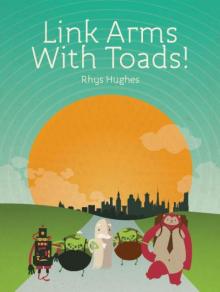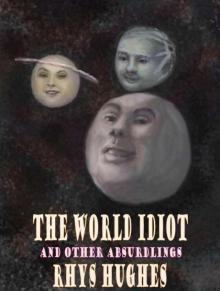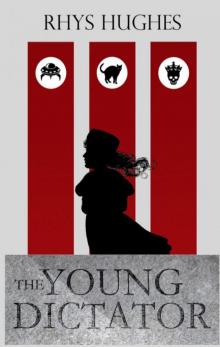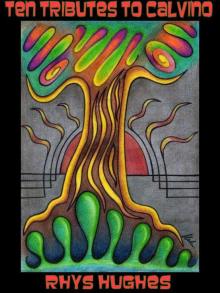- Home
- Hughes, Rhys
Ten Tributes to Calvino Page 4
Ten Tributes to Calvino Read online
Page 4
He enjoys shining on Buddhists, but there’s a paradox in one of their beliefs that he can’t get to grips with. If you are a person who believes in reincarnation, surely it makes sense to work hard to improve the general condition of the world, so that living standards rise for everyone? This way you can be certain of improved comfort in your next life, no matter where you are born! In other words, if you are very holy you need only care for yourself in this life; but if you are sinful it’s in your own interest to be good and improve the world. So good people should act in a selfish manner and bad people selflessly…
The sun isn’t ready to convert to this faith yet.
BAKING HOT DAY
Intrigued by his contact with Rustichello, the sun decided to pay a visit to Pisa, the town of the taleteller’s birth. He saw that a cunning arrangement of concave mirrors had been set up on the roof of a house. “What’s going on down there?” he mused aloud.
“This is a solar oven,” answered a stout woman.
“You expect me to slave in a kitchen for you? No chance! I work only for myself; all stars are aristocrats!”
The woman laughed. “You have been my employee ever since you got here! Don’t you know your beams are bouncing off these mirrors onto the baking tray inside my brick oven?”
“Am I baking a loaf of bread for you, then?”
“Not bread, no; the flour contains honey and raisins and apricots, and I used wine instead of water to mix it.”
Much later, the moon asked the sun, “I heard you did your share of the cooking today. Was it difficult?”
“Nah,” replied the sun. “Pisa cake.”
CREATIVITY IN THE WILDERNESS
I want to be serious just for a few moments and talk a little on the subject of Creativity in the Wilderness. The fact is that I need the sun to facilitate the proper exercise of my imagination.
I don’t mean that I don’t get ideas in the wintertime – some of my best work (if any of it is actually good) has been done in low temperatures, but never through choice. When it’s dark and chill I wish to hibernate, and so forcing myself to work is a perverse form of retirement, of hiding myself away from the cold sky: a way of taking my mind off the gloomy present moment. But this doesn’t work well…
When I’m cold all my muscles contract and I feel hunched and stooped like an old man; I lack only a corncob pipe, hobble and liver spots. I can’t wait to be warm again, to uncurl and unfurl and to live the outdoors life. I take my empty notebooks with me when it comes, and pens, and though I do less work, I’m happier in my soul.
The wilderness for me must be sun-drenched. Otherwise I can’t feel its beauty deep down; I succumb to bleakness instead and mope from cliff to cliff, or over pallid dunes, searching for a cave mouth where I can huddle around a fire of frosty driftwood sticks.
No thanks. I love the sun far too much! My creativity ripens in the sun and ferments into the wine that will keep me from despair in winter. Once I walked across the Alpujarras in midsummer, writing at odd moments as I went: the result was a novella full of inventors, explorers, mermaids and minstrels across which daily crawled large ants to greet, or challenge, the scrawl of black multi-legged words.
JUMPING INTO SUMMER
Two hikers, one male, one female, stopped for the night in a forest glade. The sun was low in the west and its ruby beams slanted almost horizontal between the rough trunks. A hooded figure watched from the shadows of the tallest tree and grimaced ferociously.
“I feel a little uneasy,” said the female.
The male hiker nodded. “I know what you mean. Spending the night in a forest is always unnerving. Not like sleeping on the beach or in dunes; there’s the constant feeling of being watched and of being at the mercy of predators or paranormal forces.”
“I’m not sure I can last until morning!”
“Very well. Here’s a solution. Night is about to fall and will probably endure for the whole of the next paragraph. If we both take a long enough run up, we should be able to jump right over that paragraph and end up in the one after it, which will almost certainly describe tomorrow morning. I think we should hold hands and do this together. Are you ready? Let’s run as far as that log and then leap…”
The sun vanished over an unseen horizon. Dusk gathered itself rapidly and the stars were very dim when they appeared through gaps in the thick canopy of rustling foliage. Owls hooted, rodents scurried and bright eyes glowed in the undergrowth; twigs snapped and the very trees appeared to unfreeze from some paralysis and move their branches like arms. Hours passed slowly, fearfully, chillingly.
Very slowly, the sky grew lighter. The night was finally coming to an end. The sun came up and climbed higher; and the character of the forest changed completely; the eeriness was utterly dispelled and now it was a cheerful place, a paradise of wild flowers and birds. The sun reached its highest point, began to descend, sank lower and lower and its ruby beams slanted almost horizontal between…
“Damn it!” grumbled the male.
“What’s the matter?” asked his companion.
“We jumped too far. We cleared not only the paragraph containing the night, but also the one describing the morning after, so we’re back in late afternoon – of the following day!”
The female considered this. Although unaware that the hooded figure had been left behind in yesterday, she said, “I don’t have the same uneasy feeling. Let’s camp here anyway.”
“I agree,” the male said, “and nothing has been lost by the jump. We’re one day closer to summer, in fact!”
THE HOUSE OF THE LYING SUN
There is a House in Old Orléans they call the Lying Sun… That’s how a song might begin. Except that this Orléans is pronounced Or-Lee-On and the house in question is a café rather than a brothel. Inside this café there are steps leading down into a cellar and in one corner of this cellar, which has been converted into a private room for patrons, the two merchants are trying to turn on each other. One of them said, “Why not purchase off me this bronze Ptolemaic model of the solar system? It depicts all the planets and stars in their correct positions!”
“No, it doesn’t; it shows the sun going round the Earth! And where are Uranus, Neptune, Pluto and Scruffy? I don’t want it. But you ought to like my efficient solar-powered torch…”
“Don’t be inane! That’s a joke, not a product!”
The other merchant gritted his teeth. “You misunderstand: it works off artificial light too! A real bargain!”
“Tell you what: why don’t we leave each other alone and go back out to search for some proper victims?”
As they climbed up the steps and then left the café, the sun shook his head and clucked his tongue. “Wine is bottled sunlight, so they say, and that cellar was full of rare vintages, so I overheard everything! Don’t they realise that Pluto is no longer an official planet? It was demoted in 2006 for an unspecified misdemeanour!”
THE BEACH BALL
The sun passed over a crowded beach in the middle of summer. He saw that people were throwing a yellow beach ball back and forth, yelling in joy as they caught it in outstretched arms. The sun studied the likeness of the ball and was highly flattered. They hadn’t included any spots. “That’s me, that is!” he announced proudly.
THE SUN BED
The two merchants approached the sun and said, “We have something to sell you that we know you’ll find very useful. In this box is the latest kind of sun bed! It’s very comfortable and perfect for tired suns. After a tough day crossing the sky and sharing your life-giving energy with plants and animals, you probably need to put your rays up and take it easy. There’s no better place than in this bed.”
“I don’t need much rest, to be honest,” explained the sun. “Just a few minutes of shut-eye every now and then; I get my winks during eclipses. Your product doesn’t interest me.”
“Don’t you ever take a siesta?”
“Only if the heat of a nearby star gets too much for me to continue
my work. And that hasn’t occurred yet.”
“Then we’ll come back after the next supernova.”
“Sorry, I don’t buy that either!”
THE JEWELLER
There was a girl who took crystals and wrapped them in wire and twisted the wire into elaborate patterns, so the crystals could be hung from little chains and worn around the neck.
In the sunlight, these crystals shone with many colours.
“What are you up to?” asked the sun, as it passed overhead. “What are you doing with those sparkly things?”
“I’m making pedants,” answered the girl.
“Pedants? I think you mean pendants,” corrected the sun.
The girl smiled. “Yes, those too.”
THE MUSIC SHOP
The sun poked its nose into a music shop and saw a depressed prisoner in a cobwebbed corner. “What’s wrong?”
The prisoner said nothing in reply. Nothing at all.
“Let me guess,” pondered the sun. “Did you share this grim shop with a friend who entertained you with tales of distant places, through which you lived vicariously as a traveller? But now your friend has been moved to a different shop and you are bored again. The bubbles of illusion have all burst. Is that what occurred?”
The prisoner remained silent, unresponsive.
And so the sun said enticingly:
“If you speak to me, I’ll write down everything you say. Maybe a book can be made from it; a bestseller!”
Still no answer, no enthusiasm, nothing.
A gust entered the abandoned shop through a crack. The strings of the neglected instruments sang badly.
“What has happened?” cried the sun. “Don’t you recognise me? Rusty cello! Rusty cello! My old friend!”
The sun often makes linguistic mistakes.
According to the moon…
THE SUNDIAL
“I wonder what time it is?” the sun said as it passed over a land where trees were dropping fruit. There was no one to ask; but then it spotted a sundial in an overgrown garden. “I just need to consult this delightful contrivance and then I’ll know.”
But it came away frustrated.
“Typical! The part that holds the information is the one part that’s in shadow and I can’t see a thing!”
TIME GENTLEMEN PLEASE
In fact it’s time to wind up this set of absurd little stories and explain that the sequence is supposed to be a microcosm of a book I wrote that itself is a microcosm of my stated project of writing one thousand linked tales. I call that project my ‘Grand Wheel’ and I’ve been working on it for many years. I’m busy on it right now but it’s still far from completion. The book I mentioned is entitled Tallest Stories and is a sample or preview of what the finished project might be like.
Provided I do get to finish it, of course… There are forces out to stop me. I am standing in the pub known as the TALL STORY and slurping my pint of stout at the bar. Unlike most other pubs, this one tends to migrate from place to place, sometimes on wheels, sometimes not. It wanders the universe like a nomad; and on one occasion it even became the universe. Next to me is the girl who makes crystal pendants. She also happens to be the female hiker; and I’m the male.
She is drinking red wine. We have just returned from a camping trip in the forest. Abruptly the front door opens and the hooded figure strides in, his cloak spattered with mud and encrusted with leaves. He gazes around and spots me. Then he cries, “There he is! What did I pay you for? Do the job now, you incompetent buffoon!”
From a table in the corner rises a man: the assassin. The long dagger in his hand glimmers in the firelight.
“No hard feelings. I’m just making a living.”
“But what have I done?” I wail.
The assassin can’t tell me; he doesn’t know why I must die. But there’s no doubt in the mind of the hooded figure, who throws back his hood and reveals himself to be… The reader!
Yes, it’s you! You out there!
But you’re inside here now… And you say:
“Yes, it’s me! I’m tired of your whimsical nonsense and I want to shut you up. I began reading this story in the hope of learning a sensible thing or two, but almost immediately I realised I had been deceived. You must die and stop writing it; and I have arranged precisely that destiny for you. What do you have to say to that?”
“You’re too late. The story is over!”
The door opens again and all the characters from all the sub-chapters swarm in, their work finished. The merchants; astronomer; boy with the toasting fork (he toasts the bread on the open fire instead); the explorer lost in the desert; Ariadne and the dead vampiric Minotaur; Rustichello; the tribal philosophers and the missionary they ate; the woman from Pisa; and the entire population of Wales.
The pub is very crowded now and when I reach the door and look out, I notice the reader walking away along a winding road, the sun casting his shadow right out of this page and onto the wall or floor next to the chair you are sat in at this very moment.
NEW YEAR’S RESOLUTION
“If sunbathing is so dangerous and can cause skin cancer I’d better stop setting in the ocean,” mused the sun to itself one day, “and only set over mountain ranges from now on.”
The Parable of the Homeless Fable
It’s high time I told you about a homeless fable I once knew. It’s always better to tell urgent tales at high time; those raconteurs who tell them at low time or middle time don’t seem to appreciate that increased chronic elevation benefits everyone. The views are finer up there, the air fresher. High time is best. And it’s high time right now, so I ought to get started while my temporal altimeter is at maximum.
There was a fable that didn’t belong to any known collection, neither from antiquity nor more modern times. Whether he was always homeless or had been expelled from some official opus is unknown; he claimed not to recall anything about his origins. I believed him then and I believe him now. I found him wandering, naked and delirious, in the street outside my house in the dark days of a very cold winter.
Naturally I took him in and nursed him back to a semblance of health. I’m not an especially sympathetic individual, my altruism isn’t copious or available on tap, but I can feel pity for a sentient entity that clearly has no chance of survival without assistance. So it was my moral duty to help. It can’t honestly be asserted that I looked forward to enjoying the company of this fabular foundling when it recovered.
For I am a loner, a misanthrope; and yes, misanthropy can apply to the creations and products of the human race as well as to the race itself. The fable is an artform I regard with distaste, a maudlin package of words that constitutes an item of propaganda. They have often been used to facilitate repression and stasis by advising those who read them to be satisfied with the existing state of affairs, to be submissive.
It is in the interests of the ruling classes, the rich and powerful elite, to foster among the poor the idea that we should all be satisfied with our lot in life, that to strive for change is catastrophic. Most fables encourage this reactionary notion: they warn the underprivileged masses to remain meek and unthreatening. They aren’t just harmless little tales but dampeners of ambition, metaphoric blows against progress.
In theory, a wise man shouldn’t help an injured fable.
But I am no revolutionary and I care not what regimes humans devise to make their own miserable lives even worse, provided I’m not included in a census of victims. Nonetheless I am an organic being with feelings, a recluse but not one with etiolated emotions; and I vowed to do my best to look after the feverish fable. I put him to bed, kept him warm, sang songs of soothing serenity while he softly slumbered.
Two weeks later, he was better. He sat at the breakfast table with me. I munched my overdone toast, spread thickly with apricot jam, and slurped my sweet black coffee and nodded politely at him and said, “Well now. It still remains to be decided what to do next with you. I have explained that you can’
t stay here indefinitely. I value my privacy and seclusion and you have already managed to disrupt my routine.”
“Thank you for saving my life, Mr Excelsior!” he replied.
I quietly acknowledged his gratitude.
“But I want you to leave this afternoon,” I added.
“I have no wish to be a burden, sir!”
We remained silent for several minutes, but there was no awkwardness in the hiatus. I don’t think he expected or even hoped I would change my mind; indeed, he seemed rather anxious to be on his way, but not because he was the roving type, like a rumour, wandering from ear to ear, brain to brain, never pinned to the printed page. On the contrary, he had a mission to get himself lodged in a book. I realised that.
A homeless fable, it occurred to me, wasn’t a real fable, any more than an approximation is a fact. On some deep thematic level he had a burning urge to secure a place in an appropriate text, to insert himself into a tome where he might flourish and reach his full potential; and it seemed I ought to aid him in this quest also. Otherwise the charity I had already expended on him would be wasted, for he would wither.
“Very well,” I said briskly. “We must find you a proper home.”
“Thank you kindly, Mr Excelsior.”
“The logical place to search is in my library.”
And that’s where we went, when my final slice of toast was gone and the jam spoon licked as clean as a table’s soul. There was a shelf of dusty volumes that were mostly collections of fables. Like a protective father, I held hands with the fable as I knocked on the spine of the first title in the line of bound books. Most of them hadn’t been consulted for decades and were cobwebbed with spiders’ domiciles.

 Link Arms with Toads!
Link Arms with Toads! The Smell of Telescopes
The Smell of Telescopes The World Idiot
The World Idiot The Young Dictator
The Young Dictator Ten Tributes to Calvino
Ten Tributes to Calvino